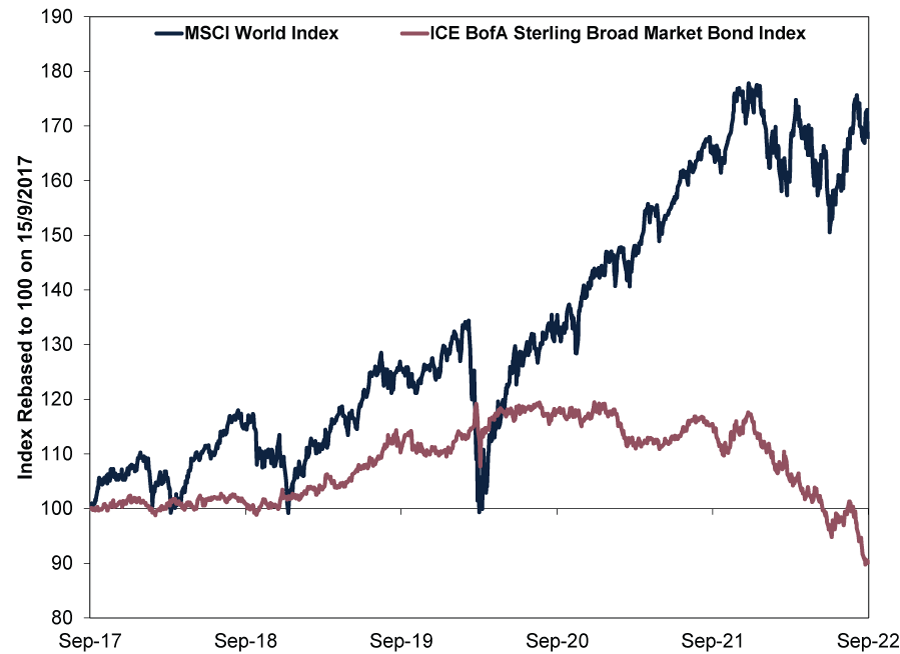Personal Wealth Management / Market Analysis
Despite Falling Alongside Stocks, Bonds Still Have a Purpose
We think investors benefit from judging their bonds’ shock-absorbing portfolio role over their entire investment time horizon, not just one rocky stretch.
UK bonds have entered a bear market (typically a prolonged fundamentally driven decline exceeding -20%) this year, whilst stocks haven’t.[i] In blended portfolios of equity and fixed-interest securities, we think bonds’ purpose generally is to provide asset-class diversification, cushioning against stock volatility for those whose goals, needs and risk tolerance make that desirable. But given this year’s environment, an investor might ask: If bonds don’t mitigate portfolio swings, why own them at all? In our view, although bonds may disappoint temporarily, they can still provide adequate cushion over investors’ required time horizons (the period investors need their money to work to reach their financial goals).
The UK’s ICE BofA Sterling Broad Market Bond Index, a gauge of investment-grade government and corporate fixed-interest securities denominated in pounds, has fallen -24.6% from its 11 December 2020 peak.[ii] Double-digit bond declines aren’t ideal, but by the same token, bonds were never riskless to begin with—like stocks, they are subject to occasional volatility. We think what matters for investors with blended allocations is that bonds are less volatile—overall and on average—than stocks.[iii]
Although it may not always feel great, a look at recent history over the last five years shows that has still been the case. When stocks fell -10.0% from 11 January 2018 through 23 March 2018, the ICE BofA Sterling Broad Market Bond Index ticked down -0.1%.[iv] (Exhibit 1) Later in 2018, stocks hit new highs 28 August, but then tumbled -15.9% to Christmas Eve.[v] The Sterling Bond Index rose 0.5% in that time.[vi] Then came pandemic lockdowns. As stocks plunged -26.1% from late-February 2020 to their mid-March low, Sterling Bonds declined -0.7%.[vii] During these times, we think bonds’ smoother path would have likely helped investors taking cash flows from their portfolios, as it makes the precise timing of security sales and distributions less impactful to overall returns, theoretically, than it would be for someone with an all-stock portfolio.
Exhibit 1: What Bonds’ Dampening Overall Portfolio Volatility Looks Like
Source: FactSet, as of 16/9/2022. MSCI World Index returns with net dividends, 15/9/2017 – 15/9/2022, and ICE BofA Sterling Broad Market Bond Index total returns, 15/9/2017 – 15/9/2022.
Now, as Exhibit 1 also shows, this year is a reminder bonds don’t always hold up better than stocks. But we think it is a mistake to extrapolate their volatility forward—in our view, bonds can still help tide investors through rough spots, even if it may not seem like it today. Moreover, bonds’ downturn to us looks akin to what we think is stocks’ largely sentiment-driven negativity this year. In our view, they seem to be moving on similar issues commentators we follow have been warning about incessantly all year, especially in bonds’ case: inflation, Bank of England (BoE) rate hikes and its imminent reduction of the Gilt portfolio accumulated through its Asset Purchase Programme.[viii] The 10-year Gilt yield hit as high as 2.64% 21 June, fell to 1.81% 2 August and is now up to 3.13%.[ix] Such big volatility amidst pronounced BoE chatter suggests to us it is roiling short-term sentiment.
But supposed BoE tightening is wildly exaggerated, in our view. Take the latest clamour we have found over the aforementioned reduction of the Asset Purchase Programme portfolio, set to let £80 billion of bonds on the BoE’s balance sheet mature every month without replacement. Commentators we follow argue the deluge of bond supply hitting markets will overwhelm them and send bond yields skyward, as if the BoE is the only source of demand for Gilts. Yet weekly Gilt turnover this year has averaged £178 billion.[x] In Q2, Gilts with maturities greater than five years alone averaged turnover of £424 billion a month.[xi] The BoE’s planned runoff doesn’t strike us as very substantial in comparison.
The large fuss over the BoE’s glacial—and well-known—balance sheet shrinkage overrates reality, in our view. Sentiment may continue to whipsaw bonds, but we think underlying fundamentals are far more supportive than those fearing a bond bear market rout give them credit for.
[i] Source: FactSet, as of 16/9/2022. Statement based on ICE BofA Sterling Broad Market Bond Index total return, 11/12/2020 – 15/9/2022, and MSCI World Index return with net dividends, 27/12/2021 – 15/9/2022.
[ii] Source: FactSet, as of 16/9/2022. ICE BofA Sterling Broad Market Bond Index total return, 11/12/2020 – 15/9/2022.
[iii] Source: FactSet, as of 16/9/2022. Statement based on ICE BofA Sterling Broad Market Bond Index total returns and MSCI World Index returns with net dividends, 31/12/1996 – 15/9/2022.
[iv] Source: FactSet, as of 16/9/2022. ICE BofA Sterling Broad Market Bond Index total returns and MSCI World Index returns with net dividends, 11/1/2018 – 23/3/2018.
[v] Source: FactSet, as of 16/9/2022. MSCI World Index return with net dividends, 28/8/2018 – 24/12/2018.
[vi] Source: FactSet, as of 16/9/2022. ICE BofA Sterling Broad Market Bond Index total return, 28/8/2018 – 24/12/2018.
[vii] Source: FactSet, as of 16/9/2022. ICE BofA Sterling Broad Market Bond Index total returns and MSCI World Index returns with net dividends, 20/2/2020 – 16/3/2020.
[viii] “Bank of England Set to Become First Big Central Bank to Sell QE Bonds,” David Milliken, Reuters, 4/8/2022. Accessed via Yahoo!
[ix] Source: FactSet, as of 16/9/2022. 10-year Gilt yield, 21/6/2022 – 15/9/2022.
[x] Source: UK Debt Management Office, as of 16/9/2022.
[xi] Ibid.
Get a weekly roundup of our market insights.
Sign up for our weekly e-mail newsletter.

You Imagine Your Future. We Help You Get There.
Are you ready to start your journey to a better financial future?

Markets Are Always Changing—What Can You Do About It?
Get tips for enhancing your strategy, advice for buying and selling and see where we think the market is headed next.





